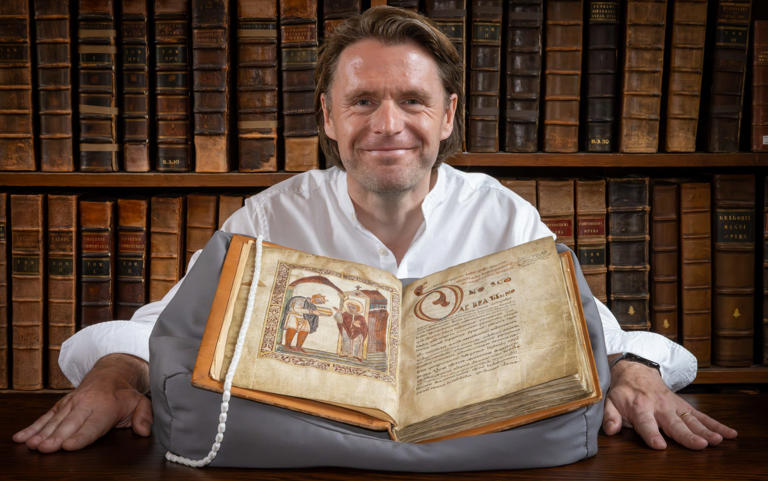Professor David Woodman is campaigning for greater public recognition of Aethelstan’s creation of England - The Parker Library, Corpus Christi College/University of Cambridge Professor David Woodman is campaigning for greater public recognition of Aethelstan’s creation of England - The Parker Library, Corpus Christi College/University of Cambridge The birth of England should be celebrated and taught in schools, historians have said ahead of the 1,100th anniversary.
England was unified under King Aethelstan in 927AD, yet few people have heard of the monarch, with most curricula opting to introduce English history from the invasion of William the Conqueror in 1066.
Now historians are calling for the forgotten king to be remembered and have formed a working group with Alex Burghart MP for a memorial to Aethelstan, and celebrations to mark the centenary of the foundation of England in 2027.
Professor David Woodman, a specialist in medieval history at the University of Cambridge and biographer of Aethelstan, said: “I first came across Aethelstan as an undergraduate and was amazed that I didn’t know about him; there was nothing about him in the UK’s schooling system.
“I think poor old Aethelstan has suffered because he didn’t have a biographer so we wanted to raise his profile and the period of England’s birth.
“There has been so much focus on 1066, the moment when England was conquered. It’s about time we thought about its formation, and the person who brought it together in the first place.”
England was unified under King Aethelstan in 927AD after he conquered York - Mary Evans Picture Library
Aethelstan was the grandson of Alfred the Great and son to Edward the Elder, both of whom had made inroads into uniting England, but the Danish king Sihtric still ruled the Viking Kingdom of York.
Within three years of coming to the throne Aethelstan had conquered Sihtric’s kingdom, and taken the title Rex Anglorum – King of the English – creating the first centralised government.
He reversed the decline in the church and learning, and summoned the Welsh and Scottish kings to take part in grand assemblies before crushing a major Viking uprising in 937AD at the Battle of Brunanburh.
Previously, historians have tended to dismiss Aethelstan’s status as England’s first king, because the kingdom fragmented again soon after his death in 939AD, but today’s experts believe he should have more acclaim.
While the Domesday Book and Magna Carta are largely credited with laying the foundations of democracy, law and governance, the seeds were sown with Aethelstan, according to campaigners.
“Just because things broke down after Aethelstan’s death doesn’t mean that he didn’t create England in the first place,” added Professor Woodman.
“He was so ahead of his time in his political thinking, and his actions in bringing together the English kingdom were so hard-won, that it would have been more surprising if the kingdom had stayed together,” he added.
“We need to recognise that his legacy, his ways of governing and legislating, continued to shape kingship for generations afterwards.”
Aethelstan was crowned on September 4, 925AD in the market square of Kingston upon Thames and the town has been commemorating this year with a series of events that culminate this week with a memorial service and address by historian Tom Holland.
But campaigners, including Holland and TV historian Michael Wood, want a longer-lasting memorial for the king, such as a statue or portrait in Westminster or Malmesbury where he was buried.
Aethelstan’s fifteenth century memorial tomb lies at Malmesbury Abbey, Wiltshire, England - Getty Images/Geography Photos/Universal Images Group
They are also calling for the history of Aethelstan’s reign and the birth of England to appear more routinely on the school curriculum.
Mr Burghart, shadow chancellor of the Duchy of Lancaster, said: “The mission is to make sure people appreciate just how England is and how significant 927AD was in history.
“The birth of England deserves to be remembered and given that England is just about the oldest kingdom to maintain its borders, 927AD is a significant date in European and world history.
“This is an opportunity to celebrate England in a very positive way and perhaps remind ourselves of England’s past.”
David Woodman’s The First King of England: Æthelstan and the Birth of a Kingdom is available from September 2.
